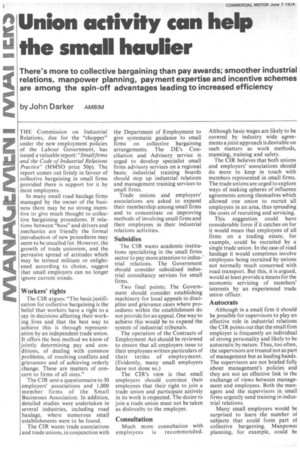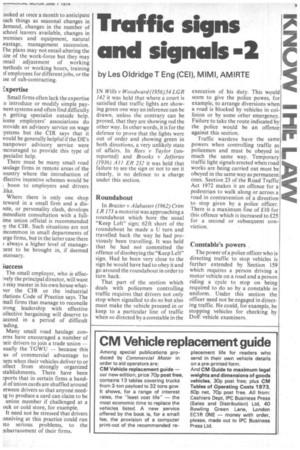Union activity can help
Page 92

Page 93

If you've noticed an error in this article please click here to report it so we can fix it.
N 1110 the small haulier 00 There's more to collective bargaining than pay awards; smoother industrial relations, manpower planning, payment expertise and incentive schemes are among the spin-off advantages leading to increased efficiency by John Darker AMBIM THE Commission on Industrial Relations, due for the "chopper" under the new employment policies of the Labour Government, has issued a valuable report: "Smallfirms and the Code of Industrial Relations Practice" (HMSO price 50p). The report comes out firmly in favour of collective bargaining in small firms provided there is support for it by most employees.
In many small road haulage firms managed by the owner of the business there may be no strong incentive to give much thought to collective bargaining procedures. If relations between -boss" and drivers and mechanics are friendly the formal introduction of new procedures may seem to be uncalled for. However, the growth of trade unionism, and the pervasive spread of attitudes which may be termed militant or enlightened according to choice, suggest that small employers can no longer ignore current trends.
Workers' rights
The CIR argues: "The basic justification for collective bargaining is the belief that workers have a right to a say in decisions affecting their working lives and that the best way to achieve this is through representation by an independent trade union. It offers the best method we know of jointly determining pay and conditions, of dealing with common problems, of resolving conflicts and grievances and of achieving orderly change. These are matters of concern to firms of all sizes."
The CIR sent a questionnaire to 30 employers' associations and 1,000 member firms of the Small Businesses Association. In addition, detailed studies were undertaken in several industries, including road haulage, where numerous small establishments were to be found.
The CIR wants trade associations and trade unions, in conjunction with the Department of Employment to give systematic guidance to small firms on collective bargaining arrangements. The DE's Conciliation and Advisory service is urged to develop specialist small firms advisory services on a regional, basis; industrial training boards should step up industrial relations and management training services to small firms.
Trade unions and employers' associations are asked to expand their membership among small firms and to concentrate on improving methods of involving small firms and their employees in their industrial relations activities.
Subsidies
The CIR wants academic institutions specializing in the small firms sector to pay more attention to indus' trial relations. The Government should consider subsidised industrial consultancy services for small firms.
Two final points: The Government should consider establishing machinery for local appeals in discipline and grievance cases where procedures within the establishment do not provide for an appeal. One way to achieve this would be to expand the system of industrial tribunals.
The operation of the Contracts of Employment Act should be reviewed to ensure that all employers issue to their employees written particulars of their terms of employment. (Evidently, many small employers have not done so.) The CIR's view is that small employers should convince their employees that their right to join a trade union and participate actively in its work is respected. The desire to join a trade union must not be taken as disloyalty to the employer.
Consultation
Much more consultation with employees is recommended. Although basic wages are likely to be covered by industry wide agreements a joint approach is desirable on such matters as work methods, manning, training and safety.
The CIR believes that both unions and employers' associations should do more to keep in touch with members represented in small firms. The trade unions are urged to explore ways of making spheres of influence agreements among themselves which allowed one union to recruit all employees in an area, thus spreading the costs of recruiting and servicing.
This suggestion could have considerable force if it catches on for it would mean that employees of all firms on a trading estate, for example, could be recruited by a single trade union. In the case of road haulage it would sometimes involve employees being recruited by unions not normally much concerned with road transport. But this, it is argued, would at least provide a means for the economic servicing of members' interests by an experienced trade union officer.
Autocrats
Although in a small firm it should be possible for supervisors to play an effective role in industrial relations the CIR points out that the small firm employer is frequently an individual of strong personality and likely to be autocratic by nature. Thus, too often, the supervisors are treated not as part of management but as leading hands. The supervisors are not briefed fully about management's policies and they are not an effective link in the exchange of views between management and employees. Both the managers and the supervisors in small firms urgently need training in industrial relations.
Many small employers would be surprised to learn the number ol subjects that could form part ol collective bargaining. Manpower planning, for example, could be ooked at once a month to anticipate ;uch things as seasonal changes in Jemand, changes in the number of ;chool leavers available, changes in 'remises and equipment, natural xastage, management succession. rhe plans may not entail altering the ;ize of the work-force but they may ;mail adjustment of working methods or working hours, training )f employees for different jobs, or the Ise of sub-contracting.
±:xpertise Small firms often lack the expertise o introduce or modify simple paynent systems and often find difficulty n getting specialist outside help. iome employers' associations do )rovide an advisory service on wage ,ystems but the CI R says that it vould be generally helpful if the DE's nanpower advisory service were :ncouraged to provide this type of pecialist help.
There must be many small road laulage firms in remote areas of the :ountry where the introduction of :ffective incentive schemes would be . boon to employers and drivers like.
Where there is only one shop teward in a small firm and a disRite, or personality clash, develops mmediate consultation with a fullime union official is recommended ly the CIR. Such situations are not mcommon in small departments of arge firms, but in the latter case there s always a higher level of managelent to be brought in, if deemed .ecessary.
>uccess
The small employer, who is effec,vely the principal director, will want 3 stay master in his own house whatver the CIR or the industrial lations Code of Practice says. The mall firms that manage to reconcile trong leadership with effective ollective bargaining will deserve to acceed in a period of difficult 'ading.
Many small road haulage conerns have encouraged a number of leir drivers to join a trade union — sually the TGWU — because this as of commercial advantage to -tem when their vehicles deliver to or ollect from strongly organized stablishments. There have been .:ports that in certain firms a handal of union cards are shuffled around etween drivers so that anyone needtg to produce a card can claim to be union member if challenged at a ock or cold store, for example.
It need not be stressed that drivers onniving at this practice could run Ito serious problems, to the mbarrassment of their firms.




























































































































































